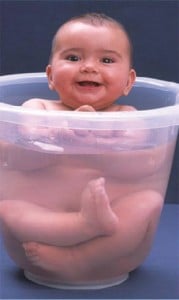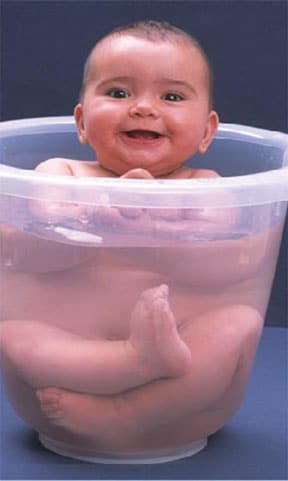
Every night, just before 7pm, I trudge upstairs to run the bath for my three children. I have done this religiously since my eldest, now eight, was a baby.
Like millions of mums, I accept the prevailing parenting doctrine, espoused by best-selling childcare author Gina Ford, Supernanny et al, that a consistent bedtime routine will help the little darlings relax and aid an unbroken night’s sleep.
Cleanliness also comes into it, I suppose. But, to be honest, bath time in our house is more a marker between the end of the day and the beginning of night.
And so the routine goes every night of the week. Bath, teeth, milk, story, cuddle, lights out, job done. See you at 7am. Gina and co would be proud.
Even when my oldest child developed small patches of dry skin which were diagnosed as atopic eczema, I remained committed to the routine, adding an emollient in the water rather than skipping bath time altogether.
Recently, when I noticed the middle child was getting sore hands from her attempts to make bubbles, I just confiscated the baby bubble bath.
At the last count, 60 per cent of babies have a bath every night, spending an average of 15 minutes in the water. A fifth of infants are bathed every other night. It’s just a natural part of bedtime routine nowadays.
But last weekend, at a party, I got chatting to a mum who is a medic. When the conversation turned to getting our youngsters off to sleep, she got straight on her soap box and declared that bathing children every night was not only a waste of water, it could dry out and damage their skin.
She finished off her argument with the shock revelation her brood get a dunking only once or twice a week.
So are the rest of us bathing our children too much?
Yes says Margaret Cox, chief executive of the National Eczema Society, who points out that as the amount of water we use to clean ourselves has increased, so has the incidence of eczema, the dry skin condition that causes the skin to become dry, red, scaly and sore.
In the Forties, the condition affected four per cent of newborns. Today, it is 25 per cent of babies and one in five children.
Margaret says: ‘People don’t realise bathing in just simple water can dry out the skin and I don’t think many people appreciate how damaging soap can be.
‘We should take bathing back to cleaning rather than seeing it as some great experience, as I don’t think we are doing our skin any good.
‘Very small babies do not get very dirty other than around their mouths and in the nappy area, so top and tailing with a cloth and warm water every day plus a couple of baths a week should be adequate. Older children should be bathed when they are dirty.
‘If there is any predisposition in the family to eczema, asthma or hay fever, I would be inclined to use an emollient bath oil, too, and to avoid all soap.
‘Routine is important and mum and baby together time is important, but it does not have to involve chucking babies and children in the bath every night.’
Professor Aziz Sheikh, chair of the allergy and respiratory research group at Edinburgh University, led a study that found the number of cases of eczema per 1,000 of the population rose by 41 per cent between 2001 and 2005 alone.
He puts the prevalence in British children at one in three — one of the highest rates in the world.
‘Potentially, bathing does increase risk because it will remove some of the surface oils from the skin. That seems to be important not only for exacerbating the eczema, but, potentially, for increasing the risk of other allergic conditions,’ he says.
Eczema sufferers become more sensitised to other allergens through their inflamed skin, he says, so are more at risk of developing allergies.
To protect the skin, Professor Aziz advises parents to keep the use of bath-time products to a minimum and use only unperfumed brands. Bubble bath, he suggests, should be avoided.
And here’s another study that should set the alarm bells ringing.
Professor Michael Cork, head of academic dermatology at the School of Medicine and Biomedical Sciences at Sheffield University, found that babies with a genetic disposition to eczema, caused by a hereditary gene defect, could be sensitised by the detergents found in even the mildest baby products during the first six weeks after birth.
‘We need much better, high-quality, randomised, controlled trialsto identify which products are best for young babies’ skin,’ he concludes.
As to how often you should bath your children, you can just use common sense — like Rose Allen, 34, from Hampshire, who has a baby and a toddler.
‘My son really enjoyed his nightly bath, but by five months he had very dry patches and I was concerned he was developing eczema,’ she says.
‘I took him to the doctor and was prescribed aqueous cream, but I didn’t use it. I found
that by bathing him less frequently, there was a huge improvement in his skin within weeks and he no longer has eczema patches.’
The American Academy of Paediatrics recommends bathing babies once or twice a week.
So, am I brave enough to go back to the more old-fashioned model of the weekly bath?
Well, I can report it’s easy enough to cancel bath time for the older children. They just run off gleefully to their bedrooms and enjoy more reading time.
But I am finding it harder to bite the bullet when it comes to the baby.
She’s so excited when she arrives in the bathroom at 6.45pm to play with the plastic dogs and water wheel that I haven’t had the heart to disappoint her.
OK, I confess. I’m also scared she won’t sleep as well if I ditch the aqua play. But, tomorrow, I’ll get those flannels out. I promise.


